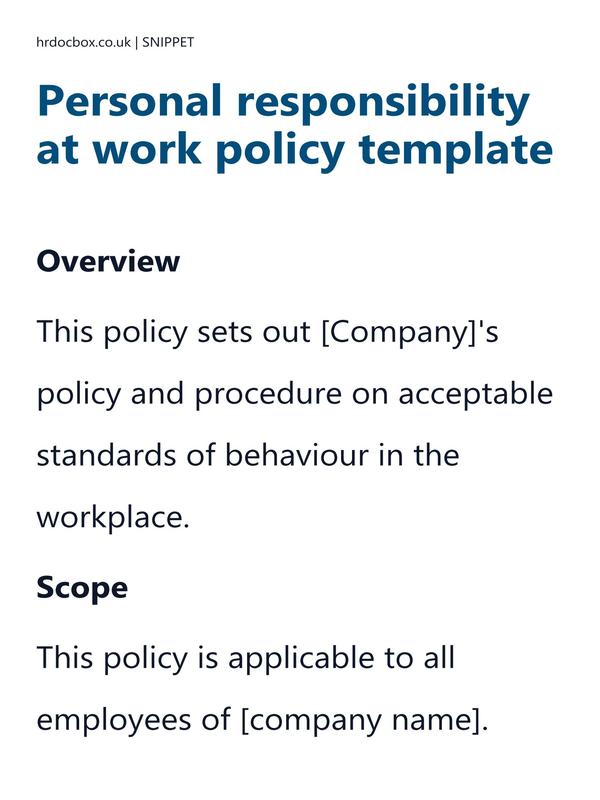Personal responsibility at work policy template


Use this model personal responsibility at work policy to set out the organisations policy and procedure on acceptable standards of behaviour in the workplace.
Standards of behaviour means the minimum standards of conduct and performance that you should expect from your employees.
Whilst it is not possible to set out in detail the standards expected in every respect, this document provides some clarity on important aspects.
- Includes 12 months' access to the Personal responsibility at work policy template, with all updates provided free of charge and notified to you.
- UK-specific accuracy.
- 896 words over 3 pages.
- Last updated 16/09/2025.
- Format: Word / plain text / email.
- Delivery: Instant download after purchase (no physical item).
- Access: Download link shown here after checkout.
- This Personal responsibility at work policy template will SAVE you up to 2 hours drafting & research, save you money, and reduce your risk.
Personal responsibility at work policy
1 Overview
1.1 This policy sets out [Company]'s policy and procedure on acceptable standards of behaviour in the workplace.
2 Scope
2.1 This policy is applicable to all employees of [company name].
3 General principles
3.1 Appearance
3.1.1 [Company] does not seek to inhibit individual choice in relation to your appearance. However, you are expected to dress appropriately at all times in relation to your role, and to ensure that your personal hygiene and grooming are properly attended to prior to presenting yourself at work.
3.1.2 If we have supplied you with a uniform of other apparel, then you must wear this at all times when required to do so; it is your responsibility to ensure that this is clean and presentable.
3.1.3 If you have any queries about what is appropriate, these should be directed to your line manager.
3.2 Access to company premises
3.2.1 You will be issued with an [identity badge / access code] allowing access to your workplace. This remains the property of [Company] loss of your [identity badge / access code] (or accidental disclosure to someone) must be reported immediately to your line manager.
3.2.2 You must not bring any unauthorised person on to [Company] property without prior agreement from your line manager, unless you are authorised to do so as part of your job. In these circumstances you are responsible for ensuring that your visitors are appropriately monitored during their stay, and that they do not access areas or company property inappropriately.
3.2.3 You must not remove [Company] property from the organisation's premises unless prior authority from your line manager has been given.
3.3 Personal property
Any personal property such as jewellery, cash, credit cards, clothes, cars, motorbikes or bicycles etc.
This is a 30% preview of the Personal responsibility at work policy template. For instant full access, purchase this item or a parent bundle.
Personal responsibility at work policy template purpose
This Personal responsibility at work policy template aims to offer you a versatile and customisable tool, serving as a solid foundation for your needs. Utilise it to ensure consistency, enhance accuracy, and save valuable time.
Adapt it to suit your unique requirements, ensuring efficiency and effectiveness in your HR processes.
Practical application of a Personal responsibility at work policy template
- Issue the Personal responsibility at work policy template during onboarding / after changes / planned refresher.
- Send it to appropriate internal recipients such as employees, workers, contractors etc. and request confirmation that is has been read and understood.
Frequently Asked Questions about a Personal responsibility at work policy template
Frequently Asked Questions about a Personal responsibility at work policy template
-
Can I use the Personal responsibility at work policy template in my small business?
Yes. The Personal responsibility at work policy template is designed to be flexible and suitable for organisations of all sizes, including small businesses and charities. It follows UK employment law best practice, so even if you don't have an in-house HR team, you can confidently apply it.
-
Is the Personal responsibility at work policy template compliant with 2026 UK employment law?
Absolutely. Like the Personal responsibility at work policy template, all of our templates are drafted with the latest ACAS guidance and UK employment legislation in mind. We review and update them regularly, so you can be confident they remain compliant.
-
Can I customise the Personal responsibility at work policy template for my organisation?
Yes, we highlight the areas of the Personal responsibility at work policy template that you need to update with your own details, and where you need to make decisions to suit your situation. This saves you time and ensures that you meet best practice.
-
Do I get instant access to the Personal responsibility at work policy template?
Yes. Once purchased, you'll be able to download the Personal responsibility at work policy template instantly. Templates are provided in editable Word or Excel format so you can customise them easily, and in PDF format for easy sharing.
-
What if I need more help, not just a Personal responsibility at work policy template?
If you're looking for broader support, we also offer toolkits and library bundles that include the Personal responsibility at work policy template, along with other HR templates and policies for fully managing your situation. These may be more cost-effective if you need deeper advice.
-
Why should I use this Personal responsibility at work policy template, and not AI to generate it?
The risk of using a free AI-generated template 'without review' includes your legal exposure, missing context, and no awareness of the wider process, whereas purchasing the Personal responsibility at work policy template from us mitigates that risk.
